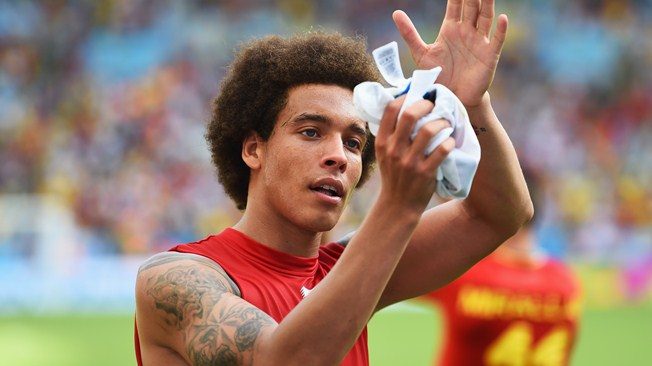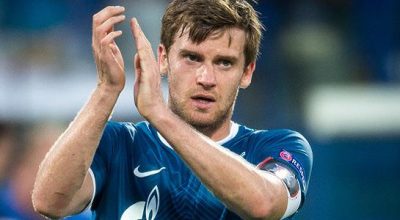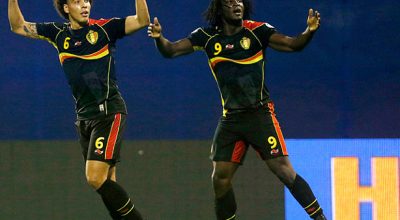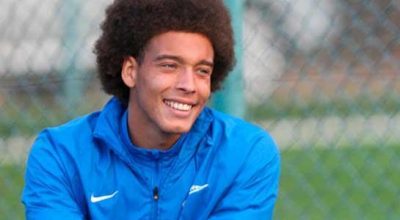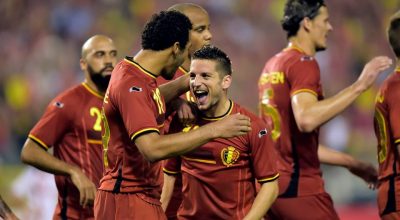Now 26, Axel Witsel is one of the figureheads of Belgian football’s much-lauded “golden generation”, one that reached the quarter-finals of the 2014 FIFA World Cup Brazil before going down narrowly to eventual runners-up Argentina.
Capped more than 50 times by his country, the Zenit St. Petersburg midfielder has become one of national team coach Marc Wilmots’ most trusted lieutenants on the pitch. A leader, a gifted technician and a precise passer of the ball, Witsel also possesses the intelligence, maturity and composure needed to ensure his coach’s orders are implemented on the field of play.
A Standard Liege youth product, Witsel helped them land back-to-back league titles in 2008 and 2009 and was Belgium’s Golden Shoe in the first of those triumphant campaigns. His performances attracted the interest of Europe’s top clubs, with Witsel choosing to continue his development at Benfica before signing a five-year contract with Zenit in 2012.
That career path is perhaps the reason why the elegant midfielder occupies less time in the limelight than those of Belgium colleagues playing for Europe’s biggest sides. Anxious to find out more about the Diables Rouges mainstay, FIFA.com sat down with him for an exclusive interview.
FIFA.com: You’re more in the media spotlight now since the World Cup. Are you pleased about that?
Axel Witsel: I’ve always had a good relationship with the media, both in Belgium and Portugal and now in Russia. The championship here doesn’t get that much media coverage, and there wasn’t much said about me when I arrived at Zenit. That all changed, though, when Hulk and the rest of them came here. The World Cup also had a big part to play, and I’m more in the spotlight now that I used to be. I like that, though it’s just another part of the job and you don’t really have much of a choice.
– Marc Wilmots has said that you and team captain Vincent Kompany are his right-hand men on the pitch. What attributes do you need to have to fulfil that role?
It was a natural thing that came about when he switched me to a defensive role in midfield. I had some good games there, which gave me confidence, and it’s thanks to that and my performances that I’ve become an important player for the national team. I’ve always been a leader, even when I was a youngster at Standard. All I’m doing now is giving my all so I can perform that role for Belgium.
– Everyone knows about your technical qualities, but what is it that makes you a leader?
I’ve been around for a few years. I started playing for the national side when I was 18 and now I’m 26. You don’t get there just because of how good a player you are. You also have to know how to communicate and when to talk to your team-mates. When I do that, when I try to get them to correct a little mistake, I always do it in a positive way. I’ve always been calm and laid-back in the way I go about things.
– You’re known for having a cool head. What makes you lose it?
You really have to push me for me to lose it (laughs). It doesn’t happen a lot, but when it does I still try to stay as calm as I can, even if that’s not easy. On the pitch it can happen when I’ve been kicked two or three times, when I see that my opponent is just out to hurt me. That’s what happens when you’re a skilful player. I watch someone like Eden Hazard, and he stays really calm despite getting kicked a lot in every match.
– What lessons have you learned from the last World Cup?
We had a team with some great players who have an awful lot of talent. It was our first major tournament together but it ended on a sour note for us in the quarter-finals against Argentina. My feeling is we could have done a lot better. That’s the lesson we have to take away from it: when it comes to the big competitions, we have to be on top of our game and at our very best the whole time. We’ve moved on now, but in the moments after that game it was very hard to take.
– Let’s talk about Wilmots now. What has he brought to Belgium?
He’s restored some discipline to the team, on and off the pitch. He’s also given us confidence and made us stronger. On top of all that our natural qualities came through and teams started to fear us. No matter who we play against now, though, we don’t have that surprise factor any more. In the past our opponents would say: ‘We’re up against Belgium. They’ve got some good players but we’ll be fine.’ Now it’s a case of: ‘We’re up against Belgium: we need to be careful.’ We’ve had to get used to playing against teams who sit deep with two lines of four and who play on the counter. There was more space for us before.
– Belgium seem to have a very tight-knit side.
We’ve known each other for quite a while now, both in the national team and at club level, and on the pitch and off it. That’s one of our strengths. We’re more than just team-mates. We’re a bunch of mates too, a group of friends. Everyone can see that when we do videos for the national team, for sponsors and the like.
– What role do you play in that group of friends? Do you have a nickname?
I’m the one who’s always calm and relaxed. I’m like the wise one (laughs). My nickname is Chaloupe(meaning “rolling gait” in French) because of my style, the way I am and the way I walk and dribble with the ball. Siramana Dembele, who was with me at Standard, gave me the name when I was 18. Then everyone started calling me Chaloupe.
– What’s your biggest attribute on the pitch? Who are your role models and in what ways have they inspired you during your career?
I think my biggest attribute is the way I shield the ball and the face that I don’t tend to give it away. Even though I play in a different position to him, Zinedine Zidane has always been an idol of mine. With his control of the ball and his skill, he’s the best in the world. I also love Andrea Pirlo. He’s pure class. He plays a little more defensively than me. They’re two players who’ve inspired me to keep working on my game, especially with my left foot and my long passing.
– You play quite high up the pitch for your club and yet you have a holding role with Les Diables Rouges. Are you happy about that?
The coach knows very well what I can do and he knows I can be a No8 and play a box-to-box game, which is what I do for Zenit. We’ll see in the future which position I’m in. I can play as a No6 if need be, though I do like to get forward.
– You’ve played for Standard, Benfica and now Zenit. Which other clubs would you liked to have played for?
When I was at Benfica I had the chance to go to Real Madrid, though it didn’t come about for various reasons. I wasn’t down about it for very long though, and I turned the page quickly. I’m 26, I’m still young and I’m a pretty patient kind of person. Even so, it was Real Madrid we’re talking about here, and when the idea was put to me I did picture a few things in my mind.
– Playing in the Russian league, which gets less media coverage than other championships, hasn’t stopped Wilmots from putting his faith in you. Does its lack of profile mean you have to prove yourself more? Would you like to play in one of Europe’s top five league’s at some stage?
Yes, it does push us to show that bit more in the Champions League or the Europa League than the players who are in England, Italy, Spain and Germany, though I try not to think about it too much. It’s always been a goal of mine to play for one of Europe’s top clubs, and it still is, though I’m trying to focus on my club because we absolutely have to win the league. We’ll see what the future holds for me at the end of the season.
